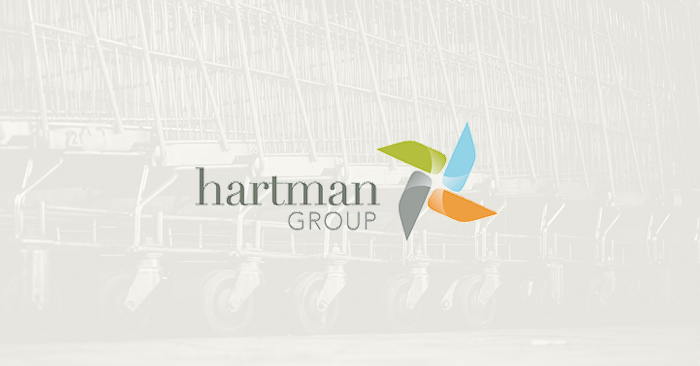The Checkout: New Age Meats Raises $2M, Hartman Studies Consumer Values
Welcome to The Checkout: an express lane for weekly news you need to know, always 10 items or less.

New Age Meats Raises $2M, Geltor Raises $91.3M
As some industry members argue that supply issues during the pandemic highlight the case for meat alternatives, investors are highlighting the need for unique solutions.
Biotechnology company New Age Meats yesterday announced it had raised $2 million led by early stage investment firm TechU Ventures, with participation from returning investors ff Venture Capital, SOSV, Sand Hill Angels and Siddhi Capital, alongside new investors the Losa Group and members of San Diego Tech Coast Angels. As part of the deal, Natanel Barookhian, TechU managing partner, has joined New Age’s board as an observer.
The raise follows the startup’s $2.7 million January seed round, and brings the company’s total funding to $5 million for developing cultivated meat products using animal cells, plant, and fungal ingredients. The Berkeley-Calif.-based startup, which launched in 2018, will use the investment to grow its food science department, enhance automation and robotics and further reduce the cost of its first product, a pork sausage, which has yet to hit the market. New Age CEO Brian Spears said that food science is “incredibly important” and the funding will help the company develop great tasting products, which will be key to their success and adoption.
“We make meat that consumers prefer to conventional meat,” Spears said in a release. “That requires us to invest in understanding how we perceive animal protein. What is the science behind the experience of smelling, seeing, and eating tasty meat?”
Also addressing the growing global demand for sustainable animal-free proteins, biotech company Geltor this week announced the closing of a $91.3 million capital round led by London-based alternative protein investor CPT Capital — a previous backer of Beyond Meat, Impossible Foods, Memphis Meats and others — along with Taiwan-based WTT Investment Ltd.
Geltor, based in San Leandro, Calif., said it will use the funds to globalize its “Ingredients-as-a-Service” platform, noting the mounting interest from CPG companies in using sustainable, functional, animal-free ingredients to fuel innovation.
“Our goal is to make it ridiculously easy for iconic brands to build sustainable products,” Geltor CEO and co-founder Alex Lorestani said in a release. “This next stage of growth will allow Geltor to meet the moment our world is facing, as businesses recognize the urgent need to transition to a sustainable protein supply chain.”
Blue Apron Adds 20,000 New Customers During Q2
With consumers eating more meals at home, meal kit company Blue Apron saw its highest customer engagement since before 2015. In its second quarter earnings report released earlier this week, the company reported a 10% net revenue increase over last year, bringing net income to $1.1 million. The brand also brought in 20,000 new customers during the quarter, bringing its total user base to 396,000.
Despite meal kits having faced issues in reaching enough shoppers, consumers spending more time at home seems to have helped the cause. Blue Apron reported higher revenues per customer with the average user spending $331 on the platform. These shoppers also seem to be staying around longer, averaging 5.4 orders, a 17% year-over-year increase. CEO Linda Findley Kozlowski said the company expects to see continued revenue growth for the rest of 2020, with Q3 revenues projected to continue rising 13% year-over-year.
“Both the positive impact of recent increased interest in cooking at home and the progress made against our growth plan are reflected in the quarterly sequential and year-over-year improvements in our key customer metrics,” said Findley Kozlowski. “As we continue to see this demand, we plan to continue to leverage our brand.”
According to Findley Kozlowski, Blue Apron has the “right strategies” in place to capitalize on the uptick in cooking. For example, to drive brand awareness, the company increased its marketing spend to $11.6 million, or 8.8% of net revenue, in Q2.
Hartman: Consumer Values Shift During Pandemic
During a webinar yesterday, Tamara Barnett, VP of strategic insights at research firm The Hartman Group, reviewed evolving shopper values resulting from the Covid-19 pandemic.
Barnett noted that the pandemic has caused “significant disruptions” in eating routines and shopping habits — including shoppers spending less time in stores. With the changes, consumers are seeking new values through products, which include personal empowerment, health and wellness and safety and efficacy.
“COVID-19 is the latest iteration of an evolution that’s been happening over time,” Barnett said in the webinar.
Barnett added that 51% of shoppers report they are paying more attention to food waste while an increasing amount also want to know how companies are fighting food and packaging waste. Consumers are also increasingly concerned about immunity, with 29% of consumers saying they’re consuming more functional food and beverages due to the pandemic.
“It’s raising the stakes and prompting consumers to reframe quality attributes and different characteristics in lines of the broader notions of health and wellness,” she said.
Additionally, consumers are increasingly paying attention to exactly how much they spend on food. Though basket sizes may have grown, shoppers are looking for value, with 28% reporting choosing less expensive brands often and 32% reporting looking for sales and coupons more often due to the pandemic. While expenses such as entertainment have dropped, consumers are increasingly considering what the “right and fair price” of food purchases is, Barnett noted. At the same time, the reduction of travel and entertainment spend has encouraged some consumers to “splurge” on food and beverage.
“It’s not that it’s so much more, but there’s less noise so they can see with much more clarity how much they were spending,” Barnett said.
SupplySide West Cancelled
Along with NACS, which announced its cancellation yesterday, SupplySide West on Tuesday announced it will not take place in Las Vegas this October.
In a video announcement, Jon Benninger, VP and market leader of show producer Informa Markets, said a “ton of input,” including a survey to CPG executives and buyers, led to the “wise decision” to cancel SupplySide West and Food ingredients North America, which were scheduled to run October 27-30. Although the hotel has recently reopened, many attendees said they would not attend due to safety concerns or travel restrictions, show director Marisa Finnegan said in a release.
Credits or refunds are being granted. A virtual platform, SupplySide Network 365, will launch in the coming weeks and will also be a part of future in-person shows.
SupplySide East 2021 is scheduled for April 13-14 at the Meadowlands Exposition Center in Secaucus, New Jersey.



















